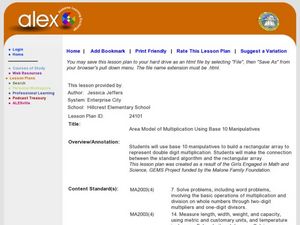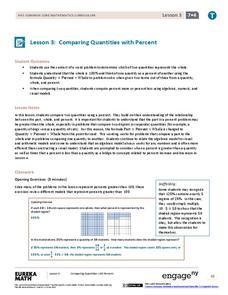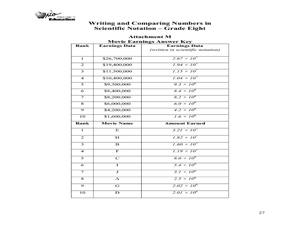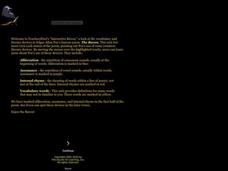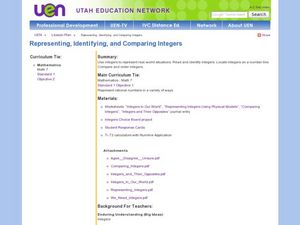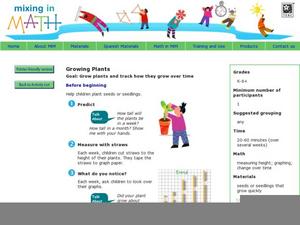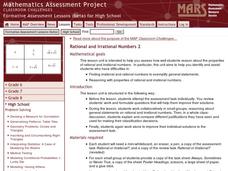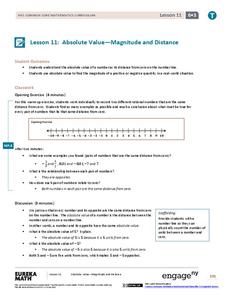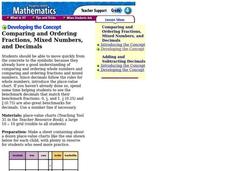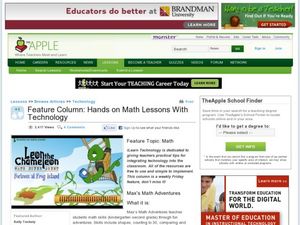EngageNY
Grade 5 Math Module 1, Topic F, Lesson 15
Remainders don't need to remain a mystery. The 16th of 18 parts in Grade 5 Math Module 1 continues the study of dividing decimals by a whole number. Scholars see how to rename the remainder to a smaller unit, such as when dividing 1.7 or...
EngageNY
Grade 5 Math Module 1, Topic E, Lesson 12
Continuing from the previous instructional activity, scholars work on mastering the skill of multiplying decimal fractions by a whole number. The method employed in the instructional activity is to convert the decimal fraction to its...
Curated OER
Area Model of Multiplication Using Base 10 Manipulatives
Explore two-digit multiplication with your class as they work in groups to build models of two-digit multiplication using base 10 manipulatives. They construct rectangles replacing standard numbers with equivalent place values using the...
EngageNY
Comparing Quantities with Percent
Be 100 percent confident who has the most and by how much. Pupils use percentages to help make the comparisons by finding what percent one quantity is of the other. They also determine the percent differences between the two quantities.
EngageNY
Comparing Methods—Long Division, Again?
Remember long division from fifth grade? Use the same algorithm to divide polynomials. Learners develop a strategy for dividing polynomials using what they remember from dividing whole numbers.
Ohio Department of Education
Writing and Comparing Numbers in Scientific Notation-Grade Eight
Explore scientific notation in this mathematics lesson plan. Young mathematicians explore multiple representations of large number in scientific notation through the use of models, visual representation and expanded form. The lesson plan...
EngageNY
Comparing Rational Expressions
Introduce a new type of function through discovery. Math learners build an understanding of rational expressions by creating tables and graphing the result.
Curated OER
Comparing Fractions with the Same Numerators, Assessment Variation
Have your class demonstrate their ability to compare fractions with this short multiple-choice assessment. Using the fractions 9/8 and 9/4, the students first make comparisons using both words and the greater than/less than signs. Next,...
Illustrative Mathematics
Comparing Speeds in Graphs and Equations
Compare two different proportional relationships on a graph. It is up to your mathematicians to determine which of two moving objects have greater speed. A good example of a Common Core multiple choice question.
Utah Education Network (UEN)
Representing, Identifying, and Comparing Integers
This resource will knock your "sox" off! It comes with so many worksheets, projects, and other attachments that help you prepare your mathematicians to see positive and negative integers in the real world, including the White Sox stadium...
Curated OER
Rational and Irrational Numbers 1
You'll need scissors, glue sticks, and mini whiteboards for this activity on rational and irrational numbers. Learners work in groups to classify a variety of expressions as rational or irrational. They are also given a mock discussion...
Mixing In Math
Mixing in Math: Growing Plants
Whether you have your class plant seeds or begin when sprouts are visible, math skills are used here to predict and track growth over time. Straw bar graphs show plant height on a given day while the graph as a whole shows changes over...
Curated OER
Rational and Irrational Numbers 2
Is the circumference of a circle always, sometimes, or never rational? Learners answer questions individually and also work in groups to look at sums and products of rational and irrational numbers. They must also be able to use the...
EngageNY
Comparison of Numbers Written in Scientific Notation and Interpreting Scientific Notation Using Technology
Examine numbers in scientific notation as a comparison of size. The 14th lesson in the series asks learners to rewrite numbers as the same power of 10 in scientific notation to make comparisons. Pupils also learn how to use a calculator...
EngageNY
Absolute Value—Magnitude and Distance
Do you want to use the resource? Absolutely. Scholars learn about absolute value and its relation to magnitude and distance on a number line. They compare numbers in context by applying absolute value.
Curated OER
Comparing and Ordering Fractions, Mixed Numbers, and Decimals
Students practice comparing and ordering fractions, mixed numbers, and decimals. In this fractions, mixed numbers, and decimals instructional activity, students examine a decimal place value chart compared to a whole number place value...
Curated OER
Mastering Math Vocabulary- The Three Bears
Integrate reading and math to increase your class' vocabulary. Read The Three Bears by Paul Galdone. Then have your third graders complete a worksheet containing math problems related to the story.
Curated OER
Using Recipes to Add Fractions and Convert Improper Fractions to Proper Fractions or Mixed Numbers
Learners use recipes to add fractions and convert improper fractions to proper fractions and mixed numbers. In this fraction lesson plan, students watch a video on someone making a recipe and compare and change the recipes to fit the...
EngageNY
Part of a Whole as a Percent
Pupils use visual models, numeric methods, and equations to solve percent problems. To complete the second installment of 20, they find the part given the percent and the whole, find the percent given the part and the whole, and find the...
Curated OER
Feature column: Hands on Math With Technology
Young learners will view a math adventures video and practice math concepts. Afterwards they will navigate through Internet sites to participate in teacher selected math adventures. This guide walks you through integrating technology...
EngageNY
Comparing Ratios Using Ratio Tables
Decide which concentration of mixtures is the strongest. Pupils use tables to compare ratios involved in mixtures. They use two methods to make the comparisons — by finding equivalent values within the tables or by comparing the values...
Rational Number Project
Initial Fraction Ideas Lesson 22: Overview
Have young mathematicians subtracting fractions in no time with this manipulative-based math lesson. Using their sets of fraction circles, students explore a number of word problems involving the subtraction of fractions before working...
Curated OER
Estimate and Compare Data
Seventh graders explore the values that are used in order to describe data that is collected or given. They compare data using the statistical analysis provided by finding the mean, median, and range.
Rational Number Project
Initial Fraction Ideas Lesson 18: Overview
Develop young mathematicians' ability to compare fractions with investigation into the number 1/2. After brainstorming a list of fractions equivalent to 1/2, children identify a pattern in the numerators and denominators that allows them...




